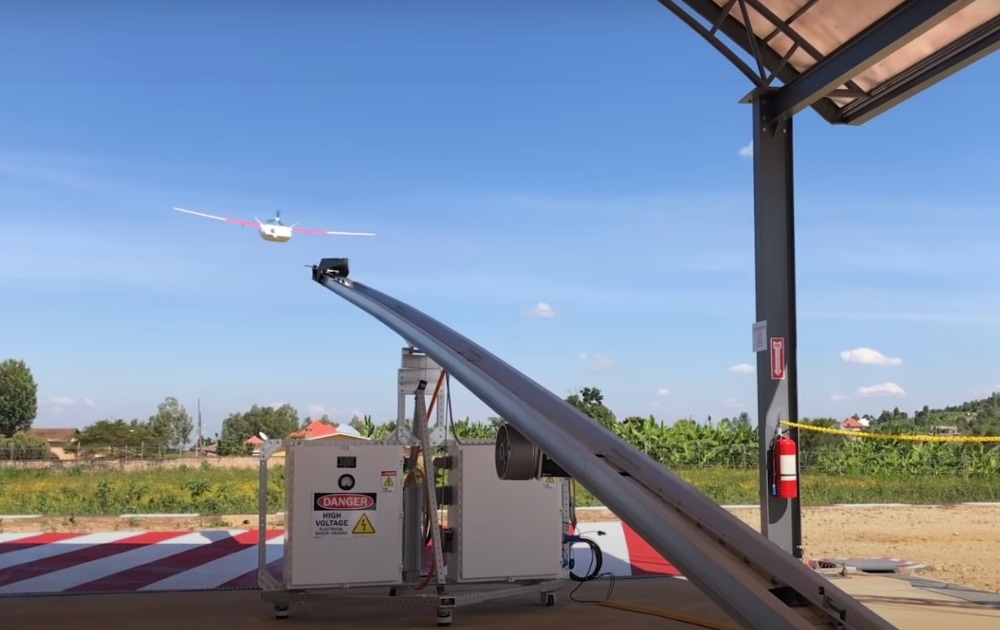Zipline Makes Deal in Nigeria, Announces New Cold-Chain Distribution Capability for Delivering COVID-19 Vaccines
BY Zacc Dukowitz
10 February 2021Zipline recently announced a new deal in Nigeria to deliver COVID-19 vaccines by drone using its proven medical drone delivery technology and infrastructure.

Zipline flight operators preparing a delivery in Ghana
Shortly after that announcement, the company issued a separate statement outlining the work it’s doing to create what it calls “cold-chain distribution capability,” which will support the delivery of COVID-19 vaccines.
Once completed, the cold-chain capability will allow Zipline to deliver all of the leading COVID-19 vaccines within any of the countries in which it operates.
And this means that, even though Nigeria may be first, it’s likely that several other countries where Zipline already operates may soon join the list of places signed up to get vaccine delivery by drone.
Drone Delivery at Ultracold Temperatures
Several drone delivery companies have already been delivering COVID-19 tests by drone, both in the U.S. and globally.
But delivering the vaccine by drone requires much trickier logistics than delivering tests, because the most common versions of the vaccine must be kept at ultracold temperatures to remain viable.
Just how cold? Moderna’s vaccine must be kept at minus 4 degrees Fahrenheit (minus 20 Celsius)—about the temperature of a freezer—and Pfizer’s must be kept at an incredible minus 94 degrees Fahrenheit (minus 70 Celsius).
Maintaining these ultracold temperatures for vaccine delivery and storage has presented logistical nightmares for those involved in the vaccine delivery chain.
In recent months there has been a buying frenzy for freezers and dry ice to enable vaccine storage. And some medical facilities, already weakened by the ongoing pandemic, have struggled to find the funds for these new cold storage requirements.
Cold chain distribution in pharma is complicated even in normal times. You have a clock ticking, you have an expiration date, you have multiple modes of transportation, multiple handoffs, from [original equipment manufacturer] all the way to administration . . .
– David Gitlin, President and CEO of Carrier Global Corp
To help address these delivery challenges, Zipline has been working with a major vaccine manufacturer (the name has not yet been made public) to develop a new cold-chain distribution capability that can be incorporated into drone delivery.
Although Zipline’s private partner isn’t public, Zipline has said that its partnership with Gavi, the Vaccine Alliance, has also been crucial in developing this new approach for delivering the COVID-19 vaccine.

Photo credit: Zipline
Zipline’s new cold-chain distribution capability has been designed to ensure that the vaccine stays at the right temperature all the way through the delivery process.
Here’s what we know about how it will work:
- Zipline will add ultra-low refrigeration capacity at its distribution centers
- Thermal validation will be conducted by Zipline upon receipt and at the point of pick-up to the patient to confirm that the vaccine has maintained the required temperature
[This new capability] will allow health facilities to bypass the need for ultra-low freezers by receiving on-demand deliveries of the precise number of COVID-19 vaccines they require at any time, safely and compliantly within the required temperature profile.
Zipline hasn’t yet shared information on how the vaccines will be kept cold while en route. The company is planning to be ready to make vaccine deliveries to all the markets it serves—both in Africa and in the U.S.—starting in April.
Nigeria’s Deal with Zipline
Zipline’s new deal for vaccine delivery was made with the Nigerian state of Koduna.
By leveraging drone delivery to reach rural populations, Koduna will be able to ship the new vaccines without having to make significant investments in cold-chain storage—investments that it wouldn’t need after the vaccine rollout was complete.
[Related reading: Zipline Snags Top Tesla Engineer to Work on Medical Drone Delivery]
Another major benefit to using drone delivery for vaccine distribution is the precision it allows when it comes to the amount of vaccines delivered to a given destination.
In addition to COVID-19 vaccines, the state of Kaduna will also be able to use its partnership with Zipline to make on-demand deliveries of medication, blood, and other vaccines. Once the program is live, deliveries will be available 24/7 from three distribution centers in the state, each of which will have 30 drones available.

Photo credit: Zipline
Zipline is no stranger to the work needed to run large medical drone delivery networks.
In the last year alone, the company delivered over one million doses of other vaccines across the continent of Africa.
And it has also begun operations in the U.S.
Last May, Zipline received permission to conduct drone deliveries of PPE and other medical supplies in Charlotte, North Carolina, and plans were recently announced for the rollout of another drone delivery program in northwest Arkansas, which will be conducted in partnership with Walmart.
Given its extensive track record and its new cold-chain capability, Zipline might soon see wider permissions granted from the FAA for making vaccine deliveries here in the U.S.
But we wouldn’t count on it. So far, the FAA hasn’t been willing to fast-track special flight approvals to accommodate COVID-19-related operations, arguing that existing rules allow for the majority of drone operations needed to fight the pandemic.
Whatever happens in the U.S., one thing we do know is that Zipline will be the first—and maybe the only—company to provide the COVID-19 vaccine via drone delivery.
Think you might see vaccines delivered to your area by drone before too long? Share your thoughts in this thread on the UAV Coach community forum.


